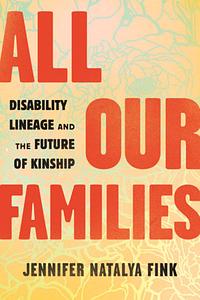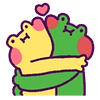You need to sign in or sign up before continuing.
Take a photo of a barcode or cover
29 reviews for:
All Our Families: Disability Lineage and the Future of Kinship
Jennifer Natalya Fink
29 reviews for:
All Our Families: Disability Lineage and the Future of Kinship
Jennifer Natalya Fink
I received a free copy of this book from Goodreads.
I'm actually glad that I received this book from Goodreads or I might not have read it. In fact I found this book very informative. While reading, I really had to rethink the way I thought about the disabled. This was eye opening. The fact that she included her own personal family made it even better. I will definitely pass this book on.
I'm actually glad that I received this book from Goodreads or I might not have read it. In fact I found this book very informative. While reading, I really had to rethink the way I thought about the disabled. This was eye opening. The fact that she included her own personal family made it even better. I will definitely pass this book on.
This writer contextualizes herself weirdly by immediately (1) naming an abandoned child based on chromosomes despite being queer, and (2) identifying as someone who has not personally experienced disability. Overall, it is a solid critical text that helps to situate a variety of disability and different ability activism/care/family structures/etc., but took a while to get into it
I found this a very wise combination of personal family history and disability narrative with critical analysis of how family of origin and chosen family, care work, and family lineage play into the quality of life and joy for disabled family members (who previously existed, exist, or will exist for everyone, regardless of whether they are aware of them).
NF: 1 , Me: 0. I struggled w writing style so it took me longer to get through even though it was <200pgs, I will say it got easier as I got used to the writers voice, also helped when it was commentary woven into story, not just commentary/analysis on its own. I do like the overarching concepts and recognizing that while categorization/labels/our current understanding does have value it is important expand definitions, examine oppression within systems, and that the integration of these ideas will benefit everyone, not just the 'target' group- better disability lineage/kinship is out there we just need less black-and-white thinking and to know it's a process, not a specific destination. Love the ideas, just wish I was able to understand what they were saying better/more in-depth as I was reading.
hopeful
informative
inspiring
reflective
informative
reflective
medium-paced
If you picked up this book as a Disability 102 overview, then this is a solid read and you'll learn a good bit. However, if you picked up this book because the title and blurb suggests that this has something new to offer the disability justice discourse, then you are sorely mistaken. Fink spends 60% of this book rehashing the work of DJ writers, thinkers, etc. and 40% grappling with her family's legacy around disability. Try as she might to separate herself, Fink still comes off as an able-bodied person trying to fit herself into the disability discourse. She is class-aware in her retelling of experiences as a mother to an autistic child, but she conveniently glosses over her own privilege that put her in that room in the first place. Kinda like the Robin DiAngelo of disability, yanno? I'd skip this book and read anything by Eli Clare, Mia Mingus, or Leah Lakshmi Piepzna-Samarasinha instead.
challenging
dark
emotional
hopeful
informative
inspiring
reflective
medium-paced
challenging
hopeful
informative
inspiring
reflective
slow-paced
challenging
hopeful
informative
inspiring
reflective
medium-paced
HAD TO RETURN TO THE LIBRARY :(
GOT ANOTHER COPY!!! It was good :]
GOT ANOTHER COPY!!! It was good :]




